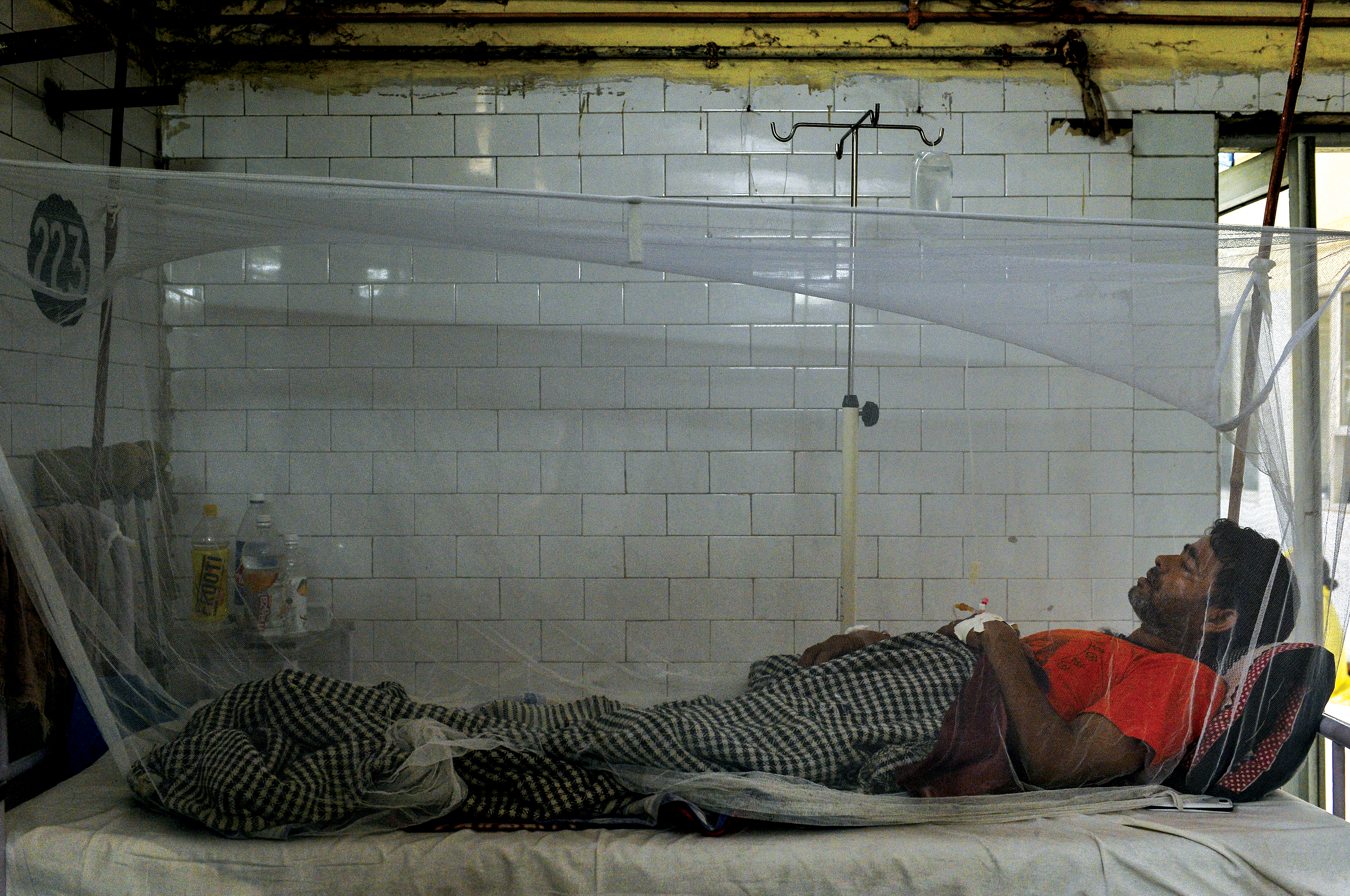
In this photo taken on September 15, 2015 Indian patient, Banarasi Das (33) lies in a bed covered with a mosquito net in a dengue ward of a government hospital in New Delhi. Hospitals in the Indian capital struggled to cope with a flood of patients suffering from dengue fever as the Delhi government warned against turning away anyone seeking treatment. AFP PHOTO / Chandan KHANNA (Photo by Chandan Khanna / AFP)
After months of intolerable heat and soaring temperatures, comes the monsoon. But while the rains bring respite to man and beast, they also give rise to waterlogged roads and overflowing drains — a breeding ground for mosquitoes, and thus rise in vector-borne diseases.
In 2018, the number of dengue cases reported in Delhi was 1,020 along with 411 cases of malaria and 109 cases of chikungunya (according to data released by SDMC on October 20). With so many cases being reported every year on a regular basis, doctors say that the Delhi government needs to take more precautions this year to stop such outbreaks.
Delhi Chief Minister Arvind Kejriwal recently chaired a meeting with the state’s Health Minister Satyendra Jain, the three municipal corporations and all the heads of hospitals to prevent the outbreak of vector-borne diseases this year.
“The next four months are very important for the health and well-being of the people of Delhi.We have to make the situation better than last year and bring down the number of cases of vector-borne diseases”, Kejrwal said in the meeting,
“We have ordered sufficient enough medicines and instructed all hospitals to be ready with this, and have also ensured that there is no shortage of medicines”, says Dr Sunil M Raheja, Additional Director (Waterborne Diseases Control) of the Department of Health and Family Welfare.
“All government hospitals have also been provided with special wards. Also, the number of beds have been increased by an average of 500 in all the government hospitals”, adds Dr Raheja. To check with his statement, Patriot visited Lok Nayak Hospital in Delhi Gate to see of the facilities had been made available yet. This is the same hospital where last year a three-year-old girl succumbed to dengue, causing a massive uproar in the city.
On enquiring, one of the doctors who did not wish to reveal his identity, said that they had not been informed of any allotment of a special ward for vector-borne diseases in their hospital. However, he said that they have received information that the number of beds in the hospital may increase by 500-700. When asked if they have enough medicines to treat patients once there is a massive outbreak, the doctor says, “We have enough supply now, but last year we ran out of medicines due to the bulk of patients coming to our hospital. It will be great if the government does supply us with more quantity of medicines.”
Dr Raheja points out that an essential step towards curbing the outbreak of diseases is the management of stagnant water by the general public. “People store still water in their households, and this is the breeding ground for mosquito larva, in addition to the drains”, he points out, adding that the ministry has instructed the three municipal corporations to check the breeding of mosquitoes in domestic households.
As per data released by the SDMC, the three civic bodies have found a total of 29,702 households in the city that have been breeding grounds for mosquitoes. The report also states that 30,461 notices have been served to owners of houses, hotels and other bodies for such illegal storage of water.
“The ministry and the corporations are organising awareness camps everywhere. That is why cases have gone down from about 15,000 in 2015 to 1,500 in 2018. This year too, with more such awareness programmes, the number will go down”, says Dr Raheja, adding that people have to be aware of the hazards of storing water in their homes.
However, according to data released by SDMC, there have already been 35 cases of malaria, 11 cases of dengue and five cases of chikungunya in June alone, taking the number of cases of vector-borne diseases to 76 from January to June. In the same period in 2018, the number of patients affected by such diseases were 92, meaning that there has been a decrease of 16 cases so far.
Whether the number of cases go down this year, is a fact that remains to be seen once the monsoon starts.
State Names Authority approves renaming of two metro stations and modifies seven others, aligning station…
Over 200 artisans showcase traditional crafts at Jawaharlal Nehru Stadium, including Narmada pebble art and…
According to the police, Army Public School in Dhaula Kuan and Air Force Bal Bharti…
Delhi's air quality remained poor, with the average Air Quality Index (AQI) settling at 207,…
According to students, the alleged incident took place at around 1.30 am on Monday, where…
Data shows majority of inmates are below 30, with police and psychologists linking trend to…